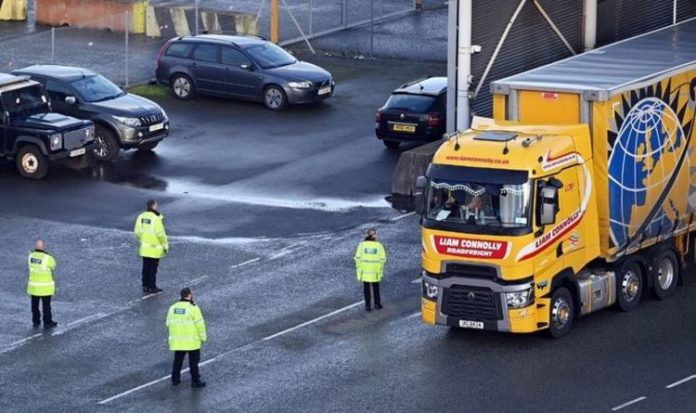Hauliers warned the extra paperwork was leading to shortages of some goods and risked leaving gaps on supermarket shelves. They said they were being “overwhelmed” by red tape with scores of lorries being turned away from ports because they had failed to fill in the correct forms. Dublin blamed the damaging hold-ups on British firms which had failed to prepare for the extra requirements despite several advance warnings.
Irish Revenue chiefs said they had taken the decision to temporarily lift some customs rules to ease the delays and prevent more trucks being refused entry on to ferries.
A Revenue spokeswoman said: “Revenue appreciates that the new requirements and customs formalities present significant challenges and impose additional burdens on businesses.
“However, we expected challenges such as this to arise where trade and or business didn’t make the necessary advance planning arrangements that we have strongly advocated over at least the last two years.
“We made it very clear in our engagements with industry that real, permanent and immediate changes would arise.”
She continued: “Those who are having difficulties is the outworking of that warning.
“However, the extent of the difficulties businesses are having as a result of the necessary changes brought about by Brexit is evident from our engagement with various trade, industry and business stakeholders over the past week.
“It is clear that many were not as prepared as they thought or significantly underestimated what was involved in being Brexit-ready.
“In this regard, Revenue has put in place temporary facilitation measures relating to the lodging of safety and security declarations that will help businesses to meet their obligations and get their goods moving.”
READ MORE: Brexit LIVE: France digs in heels over fishing export chaos to EU
Ferry operator Stena Line has cancelled 12 of its crossings until next Tuesday because of a post-Brexit decline in freight and passenger numbers.
The company said it was reviewing the sailings and schedules on Irish Sea routes as a result of Irish travel restrictions and the decline in freight volumes during the first week of Brexit.
A spokesman said: “Problems in the supply chain have resulted in a significant fall-off in freight volumes this week at our Holyhead and Fishguard ports.
“Our business model is based on a freight and passenger combination, so to have the two parts severely restricted at the same time is putting severe pressure on our ability to maintain our normal levels of frequency on certain routes.
“Volumes are expected to remain light as we move towards the weekend, consequently we will reduce some sailings on a temporary basis.”
He said: “This move from the Irish customs authorities demonstrates why we warned the Irish Government about their negotiating approach and the implications of it.
“The geography of these islands will always require pragmatism and we are seeing that today.
“Anyone who has encountered the frustration of empty shelves in supermarkets this week will be questioning why our own Government can’t take similar action.
“Despite ridiculous claims from the Secretary of State, amongst others, there is a regulatory border in the Irish Sea and we are seeing the impediments it is causing.”
DUP MP Sammy Wilson said: “Despite what the Secretary of State may claim, there is a border in the Irish Sea which is disrupting trade with Northern Ireland and also with the Republic of Ireland.
“The evidence becomes clearer by the day but it is ironic that, whilst the UK Government slavishly follows the diktats of the EU single market requirements and the bureaucracy attached to it, the Irish Government has been prepared to sweep EU documentation demands aside.”







